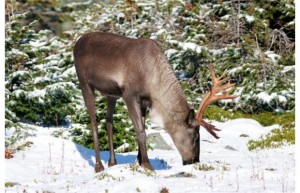Researchers say a full 50 per cent of ‘world’s last great forest’ should be protected
By Randy Boswell, Postmedia News July 21, 2013
Iconic species such as the woodland caribou “have disappeared from the southern tier of the boreal forest” and other signature wildlife of Canada’s forests — wolverine, grizzly bear and wolf — are in trouble, the panel states.
At least half of Canada’s vast boreal forest should be strictly protected from any kind of development and the rest should be carefully managed to preserve or restore its ecological integrity, a panel of top North American researchers argues in a report to be released Monday on “the world’s last great forest.”
The International Boreal Conservation Science Panel, which includes such leading Canadian environmental experts as University of Alberta ecologist David Schindler, is sounding the alarm about Canada’s 5.8-million-sq.-km expanse of northern woods and wetlands on the opening day of a global conference of biologists being held this week in Baltimore.
Encompassing more than half of Canada’s 9.9-million-sq.-km landmass, the boreal forest is described by the volunteer panel as “one of the world’s greatest natural treasures” and — along with the Siberian boreal forest and the Amazon rainforest — as one of the last three significant stretches of forested land on Earth that has “never been touched by the large-scale footprint of human industrial expansion.”
But forestry, mining and energy projects across Canada — including Alberta’s oilsands — are transforming huge swaths of the boreal frontier, destroying wildlife habitat, disrupting ancient animal migration patterns, threatening water quality and generally compromising ecosystems, the panel warns.
The researchers cite studies showing that some 730,000 square kilometres of Canada’s boreal forest — about one-eighth of the total, or an area “larger than Texas” — is “already affected by these industries and their infrastructure,” including roads and hydroelectric dams.
Iconic species such as the woodland caribou “have disappeared from the southern tier of the boreal forest” and other signature wildlife of Canada’s forests — wolverine, grizzly bear and wolf — are in trouble, the panel states.
“The wave of development pushing north through Canada’s boreal forest leaves, in its wake, an expanding list of impacted species and widespread degradation of ecosystem services,” the report asserts.
The panel’s key recommendation is that a full 50 per cent of the boreal forest should be set aside as permanent wild land — a much more aggressive conservation target than experts have previously proposed.
“It has become apparent that substantially more habitat protection than previously recognized is needed,” the panel concludes. “Older recommendations — that setting aside 10-12 per cent of a region’s land base would be sufficient to maintain a region’s biodiversity and ecological processes — are now known to reflect major underestimates.”
The panel insists that “to maintain ecological processes and the full complement of wildlife species, at least 50 per cent of an ecosystem or broad-scale landscape should be incorporated into a network of conservation areas that are free of industrial disturbance.”
While the panel says conservation initiatives “should accommodate Aboriginal traditional uses of the land and should be managed or co-managed by Aboriginal governments,” it also states that ecological protection zones should also be “enshrined in civic institutions” so that environmental commitments “cannot be changed to accommodate short-term political pressures and sensitivities.”
Report co-author Jeff Wells, science adviser to the U.S.-based Pew Charitable Trusts, said in a statement that because of the “mounting pressures on boreal regions of Canada,” efforts to sustain their “globally important conservation values will require very large protected areas.”
Along with Schindler, one of this country’s top aquatic scientists, other Canadian co-authors of the report include University of Manitoba and Parks Canada ecologist Micheline Manseau, University of Ottawa biologist Jeremy Kerr, McGill University geographer Nigel Roulet and University of Victoria environmental studies professor Nancy Turner.
© Copyright (c) Postmedia News

